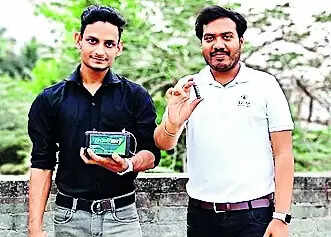Battery: Startup builds green, low-cost battery from plant-based materials | Bhubaneswar News

Bhubaneswar: The ever-increasing demand for alternative energy sources has led many startups across the country to look for solutions that are sustainable, eco-friendly as well as cost-effective.
In this search, an Odisha-based startup ‘Plantery’, founded by Abhisekh Mohapatra, an agriculture graduate, and his partner Bibhav Ranjan, a medical professional, has developed a battery made out of grass and other plant-based materials.
Abhisekh, who came up with the original idea, executed the plan after a rigorous six-month trial and is now ready with the prototype. He said their innovation can be used in rural areas where continuous power supply is a problem and also by small street vendors.
“We used grass as a raw material to make the electrolyte for our indigenous battery. We tried out several plants, of which we found some specific non-edible grass, which have the capacity to uptake high amount of elements from moist soil,” Abhisekh said.
The process of creating the battery involves extracting necessary components from the grass and converting them into liquid form. The liquid is then filtered and converted into separate membranes using natural binders. The resulting battery is capable of storing and transferring ions, making it a viable alternative to traditional batteries, which use toxic chemicals and are expensive to manufacture. While the current prototype has a capacity to run for eight hours on a single charge, the founders are working on increasing the battery’s capacity.
Bibhav said their product is non-toxic, non-explosive and most importantly eco-friendly in nature. “We depend on other countries for raw materials to make conventional batteries, but our product is indigenous,” he said. One of the key advantages of Plantery’s battery is its potential to be a power source in rural areas. The low cost and sustainability also make it an attractive option for street vendors who may not have access to reliable power sources.
Abhisekh said they have applied for a patent for their product and also recently collaborated with Indian Oil Corporation Ltd to expand their research. “The collaboration with IOCL will help us make higher capacity batteries from plants,” he said.
In this search, an Odisha-based startup ‘Plantery’, founded by Abhisekh Mohapatra, an agriculture graduate, and his partner Bibhav Ranjan, a medical professional, has developed a battery made out of grass and other plant-based materials.
Abhisekh, who came up with the original idea, executed the plan after a rigorous six-month trial and is now ready with the prototype. He said their innovation can be used in rural areas where continuous power supply is a problem and also by small street vendors.
“We used grass as a raw material to make the electrolyte for our indigenous battery. We tried out several plants, of which we found some specific non-edible grass, which have the capacity to uptake high amount of elements from moist soil,” Abhisekh said.
The process of creating the battery involves extracting necessary components from the grass and converting them into liquid form. The liquid is then filtered and converted into separate membranes using natural binders. The resulting battery is capable of storing and transferring ions, making it a viable alternative to traditional batteries, which use toxic chemicals and are expensive to manufacture. While the current prototype has a capacity to run for eight hours on a single charge, the founders are working on increasing the battery’s capacity.
Bibhav said their product is non-toxic, non-explosive and most importantly eco-friendly in nature. “We depend on other countries for raw materials to make conventional batteries, but our product is indigenous,” he said. One of the key advantages of Plantery’s battery is its potential to be a power source in rural areas. The low cost and sustainability also make it an attractive option for street vendors who may not have access to reliable power sources.
Abhisekh said they have applied for a patent for their product and also recently collaborated with Indian Oil Corporation Ltd to expand their research. “The collaboration with IOCL will help us make higher capacity batteries from plants,” he said.
We also published the following articles recently
OnePlus 13 may miss out on this big battery feature
OnePlus 13 rumored to lack wireless charging, feature Snapdragon 8 Gen 4 processor, new camera design, 2K OLED display, 50 MP main camera, periscope zoom lens, Hasselblad logo, and an ultrasonic in-display fingerprint sensor.
OnePlus 13 rumored to lack wireless charging, feature Snapdragon 8 Gen 4 processor, new camera design, 2K OLED display, 50 MP main camera, periscope zoom lens, Hasselblad logo, and an ultrasonic in-display fingerprint sensor.
















